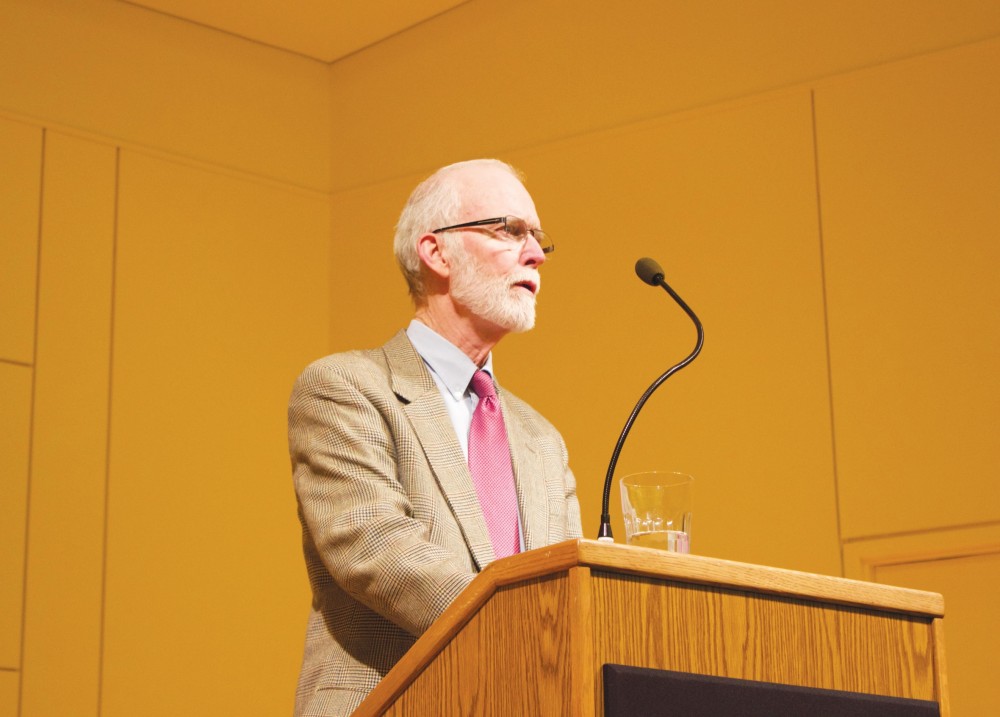 Post Classifieds
Post Classifieds
Retired Biologist Thomas F. Lee Debates Ethics at PSU
On Wed., Apr. 2nd, PSU welcomed retired biologist Thomas F. Lee to the SIlver Center to present on the ethical debates stemming from recent biotechnological advances. During the talk, titled "The Promises and Perils of the New Biology," Lee drew on his expertise of microbiology and genetic engineering while addressing ethical concerns regarding cloning, GMOs, and genetic engineering in livestock.
Lee opened the talk by defining the term "ethical" as what is good and causes no harm, and "morality" as one's personal convictions. Lee went on to ask "What is good? What are the standards by which we judge those ideals?These principles can be based on everything from complex theological arguments to simple judgments". What is physically,medically, or financially advantageous may be immoral in the eyes of many, regardless of a lack of direct harm to the subject. Lee says, "Abortion is legally and medically ethical, but at the same time, it may be considered immoral."
In 2005, Korean scientists cloned the first dog. Today, many large-scale farms are considering cloning cattle that produce large amounts of milk or grow especially large. According to Lee, "The Food and Drug Administration ruled in 2008 that meat and milk from cloned bovine and goats is as safe to eat as that from conventionally bred animals." As of now, none of these animals are on the market, but the likelihood is high that they will start appearing in the near future, as Lee says that, "These are real suggestions aimed at maximizing profitability."
In 2007, monkeys were successfully cloned, and due to the extreme similarities in the monkey and human genomes, it is likely that it will be soon be possible to clone humans. Lee presented an example of how human cloning could be helpful saying, "Putting aside religious and practical objections, picture this scenario; A three year old boy is killed in a car accident, his grieving parents are distraught over the loss of their only child. One of the boy's still living cells and an egg from the mother boy could be used to make embryos that could be implanted into the mother and let her deliver her little boy again." While this situation is currently hypothetical, it could be an option in the future. Lee defends the scenario by saying that, "Some say we're playing God by doing all this. This argument avoids that fact that modern medicine--heart transplants and kidney dialysis and more- are far beyond the reaches of nature."
Lee also addressed the subject of genetic engineering in both plants and livestock, saying that, "Genetically modified food is not intrinsically dangerous," and that, "attempts to alleviate animals suffering," through biotechnology may be beneficial. Lee says that although, "Introducing new genes (to plants) might cause proteins that cause allergies," because we do not have a full understanding of either the plant genome or the human genome due to the huge majority of genetic material that scientists have not been able to identify, it may "be our ethical responsibility to future generations", to manufacture plants that are, "resistant to disease, use less water, and effectively contain more nutrients." Considering that the human population will grow by 2-3 billion in the next forty years, food production will need to rise by 17%. Due to climate change and the consequent decrease in farmable land, this will not be possible with conventionally grown plants. According to the American Medical Association, "Crops and food improved by biotechnology are just as safe as other food and sometimes safer." In response to an audience member's inquiry as to whether Lee believes that Genetically Modified Organisms should be labeled as such, Lee said that, "Every audience member here has eaten GMOs. 80% of corn on the market today has been genetically modified. I do not believe that there should be a required label, there is nothing harmful about it, and to label it would cause confusion and fear." However, Lee did recognize that there seems to be something, "Threatening about genetically modified food," to many, regardless of political affiliation. However, Lee does recognize that the frequent use of GMOs without identification may infringe upon the ideological rights of individuals, stating that, "If a protein from a fish gene finds its way into a melon, would it become forbidden fruit for vegetarians or certain religious groups?".
Regarding livestock genetic enhancement, Lee points out that it may be the more ethical choice. He says that creating a population of animals that does not feel pain may be the more ethical choice. He says,"perhaps we can create blind hens. We would not have to cut off their beaks to discourage them from pecking each other to death." While neither of these situations is ideal, when considering a large-scale farming environment, genetic engineering may be a much less painful experience for the animals.
Get Top Stories Delivered Weekly
More theclockonline News Articles
- The Afrofutures of Feminism: Young, Gifted, and Black
- A Weekend of Darkness
- Elizabeth Warren Visits PSU
- Freedom of Speech at PSU
Recent theclockonline News Articles
Discuss This Article
MOST POPULAR THECLOCKONLINE

Campton Elementary School 8th Grade Silent Auction & Spaghetti Dinner By Rebecca Tgibedes

Will You? By Isabelle Elsasser

Summer in the Sunflowers By Emily Holleran

Student Spotlight: Sabrina Siegel By Justine Walsh
GET TOP STORIES DELIVERED WEEKLY
FOLLOW OUR NEWSPAPER
LATEST THECLOCKONLINE NEWS
RECENT THECLOCKONLINE CLASSIFIEDS
OUTSIDE THE LINES
- A Story To Sing About
- The Gap in Gum Care: Why Caring For Your Teeth’s F...
- Top Tips for Signature Scents and Better-Smelling Laundry
- A Dog Trainer’s Top Tips to Support Pets Through Life S...
- Clear the Air of Indoor Pollutants This Spring
- Stroke & Dementia in Black Men: Tips for Staying Healthy...
- Hispanics and African Americans at Higher Risk for Eye...
- African Americans at Higher Risk for Eye Disease
- Infinity Kings: Final Book In A Favorite Fantasy Series
- What You Need To Know About Keratoconus and the iLink...
FROM AROUND THE WEB
- Pioneering Fast and Affordable Broadband for the Underserved
- 7 Reasons Renting an RV Should Be On Every Family’s S...
- Don’t Let Diabetes Shortchange Your Golden Years
- No Child is Forgotten By Marine Toys for Tots
- Sweeten Your Springtime Salads With Healthy Chilean Grapes
- Young Author Translates 4,000-Year-Old Text to Reveal...
- Keeping Cool and Energy-efficient Amid America’s “...
- Addressing Sarcopenia with a Healthy Diet
- Subway’s New Wraps Elevate Eating on the Go
- Family Teacher Conference Topics Beyond Academics
COLLEGE PRESS RELEASES
- Shoff Promotions Comic Book & Sports Card Show
- Semiconductor Research Corp unveils 2024 Research Call, $13.8M Funding
- Charles River Associates Opens Second Scholarship Cycle, Expands to the UK
- BLUMHOUSE AND AMC THEATRES LAUNCH FIRST-EVER HALFWAY TO HALLOWEEN FILM FESTIVAL
- THE GEN Z IMPERATIVE: LISTEN TO FEELINGS AND GIVE GEN Z A VOICE














